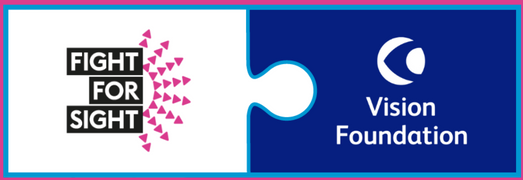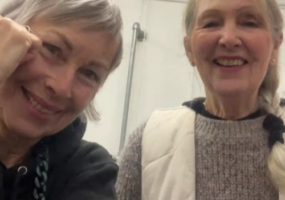It’s Father’s Day weekend!
We chatted to three incredible Dads who’ll be celebrating (and celebrated) this Father’s Day. Vision Foundation’s Director of Finance and Resources, Olly, Trustee, Amit and Regular Contributor, Chris are at different stages of fatherhood and have kindly shared their experiences of raising their children.
Olly
On my very first Father’s Day, my daughter Harper was less than two weeks old. Her gift to me then was a footprint in a piece of clay, which provoked a frankly excessive amount of screaming as she was coerced into its creation. Now that she’s turned two and I’m having my third Father’s Day, the time I get to spend with her continues to be the highlight of every one of my days… albeit there is still quite a lot of screaming. There has been no greater reward than watching her develop and grow – she surprises me almost every day with something amazing that she’s learnt, and I can while away hours reading books with her, dancing in the kitchen to (truly dreadful) children’s songs, or parading around the garden with her as she deluges the plant life with her miniature watering can.
I am however the middle piece of my Father’s Day puzzle, as I shall in turn be celebrating with my own dad (no doubt scrambling to find a last-minute card and gift, as is customary). My dad has lost his sight over the last few years and is registered blind. Something that has really stuck out to me is the immense difficulty he has faced in dealing with sight loss at an older age. And when I contrast the two sides of my Father’s Day, it is really hard to see how tricky it is for my dad and my daughter to interact and do things together, particularly as my dad is only at the early stages of navigating a world without sight. Simple things in their relationship that would come naturally to most – playing with her toys, reading a book together, or even being able to pin down a wandering toddler for a cuddle – now take concerted thought and effort. There is sadness in this, but I also know how much happiness she brings to my dad, and how so many of the pleasures of being a granddad – listening to her happily chatting, singing songs, and clattering around causing general mayhem that he knows he can delegate to his son to resolve – are not lost with the loss of your sight.
Amit
I always wanted to be a dad. Or rather, I always knew that I’d be a dad. I just never thought it would be like this. When I lost my sight, out of the blue, kids were the last thing on my mind. Yet here I am, with a 5-year-old and 3-year-old running around and creating chaos all around me. Like many parents, I spend my days wincing in pain as I step on disregarded Lego bricks, trying (unsuccessfully) to get my darling children to eat anything resembling a vegetable and have tried every trick in the book to get them to sleep too. So, what is so different about being a blind dad? Nothing! My sight loss hasn’t stopped me from being a loving caring parent, I changed their nappies, I prepare their meals, feed them, bathe them, read them their bedtime stories & now I do the school runs too. I do everything any other parent does for their kids, but I do it slightly differently. With the aid of braille, I can read to them. New technology and helpful apps give me the ability to identify colours, shapes and read labels on food packages. It may be a little daunting at first (having children, that is) but you soon learn to trust in your parenting abilities.
I really got to know my son when my wife went back to work full time and I took over the day care for the 2 days a week that he wasn’t at nursery. You’d usually see me pottering around with a baby strapped to my chest, left hand on my guide dogs harness and singing nursery rhymes (all with a huge smile on my face). Being self-employed meant that I wasn’t able to say no when work things popped up on my childcare days, but it meant that I took my son along with me instead. He was a regular face at 10 Downing Street and has accompanied me whilst I gave presentations to corporate clients, MPs as well as to charities that I work with. I always wonder where he gets his confidence from, but he’s been surrounded by people from all walks of life since such a young age, nothing phases him.
Now with a little sister around, my son’s confidence has grown even more and appears to be rubbing off on her – and this is despite her not having seen much more than our 3 faces for the best part of two years because of Covid. And as for me, Covid has made the past few years tough for me, for a variety of reasons, but having my kids around and being able to make the best of the quality time we have together has been special.
What advice would I give to any new or expectant fathers? Trust in yourself – don’t worry about doing things differently or being creative and remember, kids don’t come with a manual so find a network or group to help support you through it.
Chris
There’s 10 years between Kira and William meaning their experiences of my change in sight are very different. Kira, my eldest, was 18 when my sight loss started to have a real impact meaning I couldn’t teach them to drive any more. At only 8 the impact to William was more questioning why I was making him walk everywhere instead of taking the car!
As things continue to degrade, I’m becoming ever prouder of them both. Kira now often takes the role of sighted guide when directing me when we’re about town and William’s much more aware of his surroundings, learning to be super-careful when spotting obstacles on the school run. He can get impatient when waiting to cross roads but I don’t think he’s quite old enough to take that responsibility just yet!
There’s an expectation that dads are the strong head of the family, meaning it can be difficult to let our children see us at our most vulnerable, especially when they’re so young. I’ve learnt that it’s better for everyone not to bottle things up and allow them in. This helps them see that it’s “ok to not be ok” and teaches them that it’s important to look out for those who may need help, no matter who they are.




